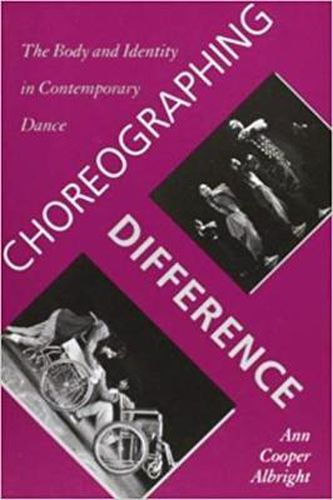Readings Newsletter
Become a Readings Member to make your shopping experience even easier.
Sign in or sign up for free!
You’re not far away from qualifying for FREE standard shipping within Australia
You’ve qualified for FREE standard shipping within Australia
The cart is loading…






The choreographies of Bill T. Jones, Cleveland Ballet Dancing Wheels, Zab Maboungou, David Dorfman, Marie Chouinard, Jawole Willa Jo Zollar, and others, have helped establish dance as a crucial discourse of the 90s. These dancers, Ann Cooper Albright argues, are asking the audience to see the body as a source of cultural identity - a physical presence that moves with and through its gendered, racial, and social meanings.
Through her articulate and nuanced analysis of contemporary choreography, Albright shows how the dancing body shifts conventions of representation and provides a critical example of the dialectical relationship between cultures and the bodies that inhabit them. As a dancer, feminist, and philosopher, Albright turns to the material experience of bodies, not just the body as a figure or metaphor, to understand how cultural representation becomes embedded in the body. In arguing for the intelligence of bodies, Choreographing Difference is itself a testimonial, giving voice to some important political, moral, and artistic questions of our time.
$9.00 standard shipping within Australia
FREE standard shipping within Australia for orders over $100.00
Express & International shipping calculated at checkout
The choreographies of Bill T. Jones, Cleveland Ballet Dancing Wheels, Zab Maboungou, David Dorfman, Marie Chouinard, Jawole Willa Jo Zollar, and others, have helped establish dance as a crucial discourse of the 90s. These dancers, Ann Cooper Albright argues, are asking the audience to see the body as a source of cultural identity - a physical presence that moves with and through its gendered, racial, and social meanings.
Through her articulate and nuanced analysis of contemporary choreography, Albright shows how the dancing body shifts conventions of representation and provides a critical example of the dialectical relationship between cultures and the bodies that inhabit them. As a dancer, feminist, and philosopher, Albright turns to the material experience of bodies, not just the body as a figure or metaphor, to understand how cultural representation becomes embedded in the body. In arguing for the intelligence of bodies, Choreographing Difference is itself a testimonial, giving voice to some important political, moral, and artistic questions of our time.